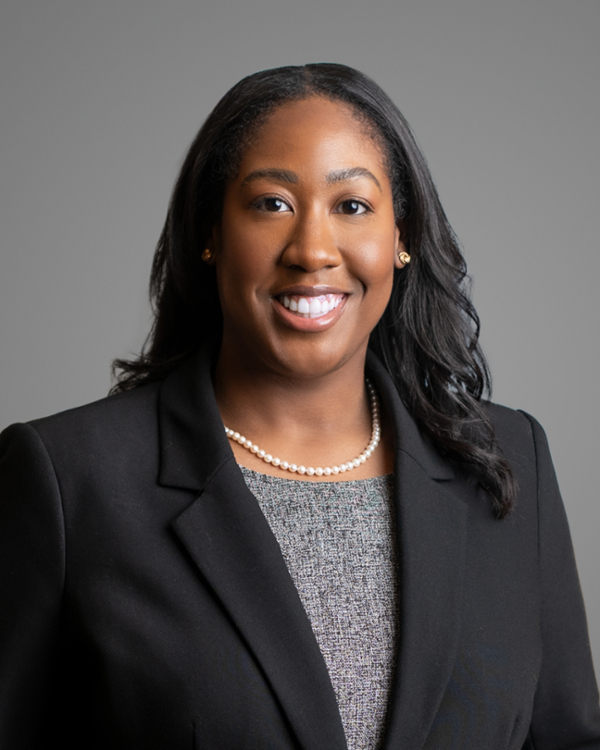Published on March 7, 2021 by Morgan Black

Brandi Russell, a 2016 graduate of Samford University’s Cumberland School of Law, has been appointed as the chief diversity and inclusion officer and director of talent management for Balch & Bingham. In her role, the first of its kind for the national law firm, Russell will coordinate with firm leadership and its Diversity, Equity and Inclusion Council to lead strategy addressing opportunities to enhance diversity and inclusion at every level. In this interview, she reflects on her legal education at Cumberland, mentors who have inspired her, and shares advice for how we should aim to address issues of diversity and inclusion as well as advice for law students as they prepare to enter the workforce.
How did Samford University’s Cumberland School of Law prepare you for your career?
Cumberland’s environment cultivates collegial, scholarly interaction. While there, I not only engaged in stimulating curriculum, I also emerged as a student leader planning and facilitating some of the law school’s most prestigious events central to efforts to increase diverse recruitment and programming. The skills I honed at Cumberland enhanced my law school experience and continue to serve me in more ways than one.
What was your first role out of law school and how have you progressed to where you are today?
I began my law admissions career as an admissions counselor at a small regional law school in Savannah, Georgia. About a year later, I joined Mercer Law School in Macon, Georgia, where I was quickly promoted to a leadership role as director of admissions and financial aid. In my tenure at Mercer Law, I oversaw all recruitment activities, provided comprehensive financial aid services, and supported the law school’s efforts to increase diversity among the student body. Soon thereafter, I joined Alabama Law as assistant director of admissions, where I broadened my skills in recruitment, retention, and diversity and inclusion to reach people across the nation. Now, as chief diversity and inclusion officer and director of talent management at Balch & Bingham, I am able to marry two of my passions – diversity and inclusion and student recruitment and development.
What influential relationships and/or mentors formed at Cumberland School of Law helped shape your career? And, if applicable, how will these relationships help you in your new role?
My most influential relationships formed at Cumberland were with Cassandra Adams, Cumberland’s former assistant dean of public interest, and T. Brad Bishop, my first-year contracts professor. Dean Adams remains an influential mentor for me both professionally and personally. I met her as an eager – and a bit frightened – young law student. As our relationship grew, she inspired me to dream on a grand scale and to explore varied opportunities. She poured into me faith and wisdom. Today, she remains a trusted confidant. Professor Bishop embodies the qualities of a premier academic – devoted, engaged and balanced. As my first-year contracts professor, he promoted and cultivated a sense of community in the classroom and found unique ways to engage students in the course material. His example still resonates with me today.
What goals do you have as Balch’s first chief diversity and inclusion officer?
I hope to help inspire a bold energy around cultivating inclusive spaces. We are all members of the Balch family because we believe in the mission of Balch – to cultivate a diverse team that is empowered to deliver value with a creative approach, practical counsel, and proactive insight and to ensure that our communities flourish and advance. If we believe that, then each person in our ecosystem needs to feel a sense of belonging enough to advance through creativity.
From your perspective, how should we, as a society, aim to address issues of diversity and inclusion? What can we do better?
I believe progress begins within and requires us to first acknowledge our implicit biases. The behaviors and experiences of one effect the experiences of others, and by understanding our biases we are better equipped to proactively counteract societal normative values and to create spaces of belonging and a sense of security for all. It seems as though society is reaching a tipping point of consciousness and it is imperative to maintain the momentum as a collective. As society moves through awareness and allyship to advocacy, I hope we will see more people hold one another accountable for inappropriate behavior on behalf of marginalized groups to effect impactful and longstanding change.
What advice do you have for law students as they navigate their career search and prepare to enter the workforce?
Always seek out mentors and sponsors who will guide you and advocate strongly on your behalf. As you navigate your career search, be open to new and varied experiences, take advantage of networking opportunities, and always have a resume on hand. I received my summer job opportunity after my first year with Judge Shanta Owens, in part, because I was able to provide her with my resume during our initial introduction. As you enter the workforce, believe in your abilities and find opportunities to further develop your skills.
Samford is a leading Christian university offering undergraduate programs grounded in the liberal arts with an array of nationally recognized graduate and professional schools. Founded in 1841, Samford is the 87th-oldest institution of higher learning in the United States. Samford enrolls 6,101 students from 45 states, Puerto Rico and 16 countries in its 10 academic schools: arts, arts and sciences, business, divinity, education, health professions, law, nursing, pharmacy and public health. Samford fields 17 athletic teams that compete in the tradition-rich Southern Conference and ranks with the second highest score in the nation for its 98% Graduation Success Rate among all NCAA Division I schools.
